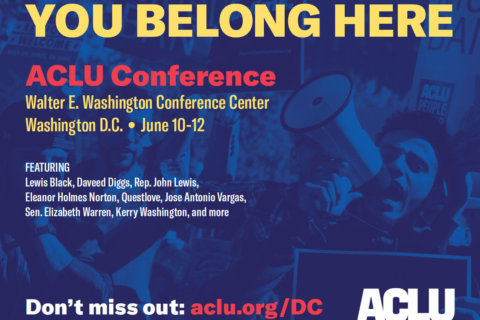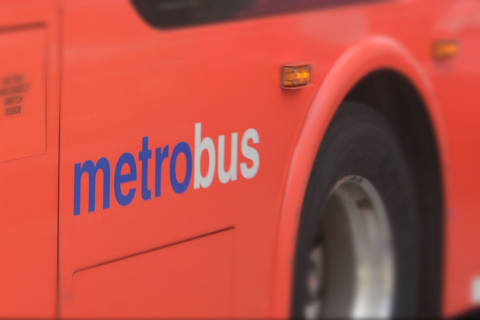WASHINGTON — If Metro accepts an ad for an ACLU conference, it could be forced to run ads for Ku Klux Klan rallies, the transit agency argues in a new court filing.
Metro responded Sunday to an urgent request from the American Civil Liberties Union that a judge order Metro to run ads for the ACLU conference in Washington next month, arguing that any urgency was only created by the ACLU waiting as long as possible to submit the proposed ad for approval.
“Any need for emergency relief is a fiction created by the ACLU,” Jessica Wiesel, an Akin Gump attorney in Los Angeles working for Metro said in an email to the ACLU’s lawyer Friday morning.
Registration for the conference opened in March.
Metro rejected the ACLU ad earlier this month on the grounds that it violates Metro’s bans on ads that are meant to influence the public on issues where there are varying opinions, or ads that are meant to influence public policy. The bans are intended to prevent many controversial ads from appearing in the Metrorail system or on Metrobuses that could make riders or workers uncomfortable or prompt vandalism or violence.
The proposed ACLU ad said “you belong here” with a list of some of the speakers or performers at the conference, such as Kerry Washington, Rep. John Lewis and Questlove. The first version of the rejected ad had an image of protesters in the background, while the second simply had the text on a blue background.
Metro filings indicate the agency rejected the second version of the ad Friday — although the decision was not immediately communicated to the ACLU — due to what the agency found through the website provided on the ad: encouragement to come to the conference, join the ACLU, and organize to support civil liberties.
The actual link on the revised ad went to a “page not found” error message Monday morning, but the conference information was available elsewhere on the website.
“The agenda for the conference plainly depicts its political advocacy, detailing programs titled: “The Rule of Law in the Age of Trump”; “The Boomerang Effect: How US Militarism Abroad Undermines Civil Liberties at Home”; “The War on Immigrant Women at the Border”; “Smart Justice: Dismantling Mass Incarceration”; “Voting Rights for The Resistance”’ and “White People Have to Do Something: Race in America,” Metro argued.
That type of background research has been supported in other related rulings, like one temporarily supporting Metro’s decision to take down ads for a book by far-right activist Milo Yiannopolous.
“WMATA is not required to ignore the political advocacy content and purpose of the conference and (the) plaintiff’s long history of political advocacy when deciding if an ad violates its guidelines,” Metro argues. “Were it otherwise, WMATA would have to accept ads from all manner of political advocacy organizations — national parties, political action committees, right-to-life and pro-choice groups, and even groups like the Ku Klux Klan.”
Metro does not communicate directly with any proposed advertisers, only going through the third-party contractor that gets a cut of advertising sales. That creates additional delays in some discussions, but provides Metro some cover in the event that certain ads do not get formally reviewed by the transit agency.
“By (the) plaintiff’s reasoning, if the Ku Klux Klan proposed an advertisement that invited people to a Klan rally, WMATA would have to run it in its advertising space. This Court would have to ignore the fact that the Klan’s political messages and leanings are well-known and would be understood by most of WMATA’s customers and employees,” Metro’s lawyers said.
Metro also said the largest words on the ACLU ad — “you belong here” — are meant to send a message of acceptance to immigrants, and anyone attending the conference would be forced into political advocacy since registration includes automatic ACLU membership.
“If WMATA allows ‘You belong here’ from a well-known immigrants’ rights advocate like (the) plaintiff, wouldn’t it have to allow an ad from an anti-immigration group that states ‘You don’t belong here’? That is the type of political debate that WMATA sought to foreclose by excluding all issue-oriented ads from its advertising space,” Metro said.
The ban on all issue-oriented ads was implemented in 2015 to prevent an anti-Muslim activist from placing ads in the Metro system that the transit agency worried could spark a dangerous backlash.
That ban was intended to be temporary until a more detailed policy could be implemented, but it has remained in place.
Do ads on Metro even work?
Metro also argues that the ACLU cannot even be sure advertising in the Metrorail system or on the sides of buses would actually get more people to come to the conference.
“Plaintiff offers nothing more than speculation that advertising in WMATA’s transit system would increase conference attendance,” the court filing said.
The ACLU has advertised the conference in other ways, including online and on radio and television, and said the Metro ads must be approved by Wednesday in order to get them posted before the start of the conference at the Walter E. Washington Convention Center, June 10. (The ACLU ad mistakenly refers to it as the Walter E. Washington Conference Center.)
Metro argues the conference would face minimal harm at most if the ads are not posted in rail stations and on buses.
“For WMATA, if it is forced to run the ads, it will set a precedent that undermines WMATA’s ability to control its advertising space,” Metro argued. “If the plaintiff’s ad runs in WMATA’s advertising space, WMATA will lose the ability to foreclose ads for other political conferences and rallies, including those by political parties, well-known hate groups and other controversial political speakers.”
Metro also hoped the judge would consider Tuesday that the ACLU’s request came at the last minute before a holiday weekend in a case that both sides had agreed to put on hold until an appeals court ruled in a related challenge to Metro’s advertising guidelines filed by the Catholic Archdiocese of Washington.
A federal judge could rule on the ACLU’s request as soon as Tuesday afternoon.







